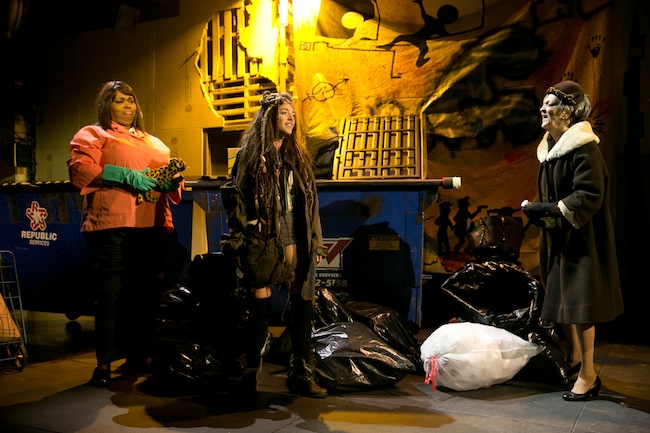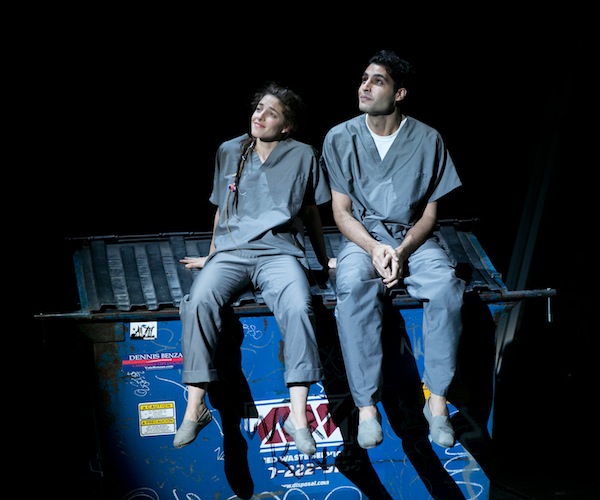Fuse Theater Review: “O.P.C.” — Thinking Outside of the Prada Box
If the fate of life on earth comes down to mother and daughter bonding over a racy passage in Anaïs Nin, then the whales should just call it a day.
O.P.C. by Eve Ensler. Directed by Pesha Rudnick. Staged by the American Repertory Theater at the Loeb Drama Center, Cambridge, MA, through January 4, 2015.

Dumpster Diving: Liz Mikel as Sister Ro, Olivia Thirlby as Romi, Nancy Linehan Charles as Mrs. M. Photo: Evgenia Eliseeva.
By Bill Marx
Perhaps, I thought, when I first heard about the world premiere production of Eve Ensler’s O.P.C. at the American Repertory Theater, entrepreneur-in-chief Diane Paulus has got the escapists right where she wants them. After the Broadway-bound inspiration of Finding Neverland and the dewy didacticism of Witness Uganda (think of those struggling African orphans!), the stage’s left-leaning audiences have been lulled into a stupor, chloroformed into sentimental swoons, charmed by magic tricks, elevated by show tunes. Now is the time to zap them to attention with a play that deals with our shamefully inadequate response to threatening environmental problems in the real world – global warming, rampant consumerism, catastrophic pollution, and the collusion of the Democratic Party with corporate agendas.
The planet needs the help. On the issues, I am shoulder to shoulder with Ensler — it is well past the time to hit the barricades. What is happening is a global tragedy that demands nothing less than our ultimate concern: even if we start now, it will take hundreds of year to remedy the damage generated by melting ice caps, rampant deforestation, and the accelerating destruction of plants and animals. We are dithering as the future vaporizes. Think of what Mark Twain or H.L. Mencken would do with our hypocrisy, stupidity, self-righteousness, and greed in the face of climate change. Talk about a carnival of lethal buncombe!
But O.P.C. is a love tap, not a slap. Your average skit on TV’s Jon Stewart or Stephen Colbert packs more corrosive punch. Liberal America gets off scot free — after some finger-wagging about overconsumption and success-mania it is sent merrily on its way, handed a vaporous dose of guilt rather than realpolitik marching orders.
This is a surprisingly tepid response coming from Eve (The Vagina Monologues) Ensler. O.P.C. is neither a provocative political drama nor a rousing jeremiad castigating us trashing mother earth. Instead of creating hard-hitting satire, cutting against the blather spewed on all ideological sides, slicling through the ‘concerned’ media baloney (Fox News turns its logo ‘green’ on Earth Day), the play strives to be a sort of feel-good sit-com in the Brady Bunch mode. The mildly amusing piece sprinkles Public Service Announcements and save-the-planet factoids into a hodgepodge of bedroom farce, twenty something romance, boomer melodrama, mother/daughter soap opera, and counterculture yak. Perhaps the idea is that coming on too strong about the enviornment and middle-class waste would discourage well-heeled audiences rather than galvanize them into action. But O.P.C.is so conventional it ends up undercutting its half-hearted call for action. If the fate of life on earth comes down to mother and daughter bonding over a racy passage in Anaïs Nin, then the whales should just call it a day.

Olivia Thirlby and Babak Tafki in “O.P.C.” Photo: Evgenia Eliseeva.
The plot, such as it, deals with Romi, a young woman with an extreme case of obsessive political correctness. At the start of the play the freegan is squatting, dumpster diving for her food, and generally sounding off about the insanity of an America that worships buying stuff cheap, to the point it can live with slave labor in China (and Walmart) for the sake of saving 25 cents on a pair of socks. Her mother, Smith, is running for the U.S. Senate and she is aghast at Romi’s lifestyle, fearful about how it will effect her campaign. Romi’s father, Bruce, makes sympathetic noises, sister Kansas, rigid to a fault, is helping out with Mom’s election bid. Then Romi hooks up with Damien, a mysterious, power-hungry boy friend. She creates a dress made of fruit skin that becomes a mega-popular fashion style and then falls for a pair of Prada boots that turn her into a robotic member of the glittery bourgeois. But Romi is jolted into a mental breakdown at a party filled to the brim with gauche political incorrectness; she is put into some sort of Betty Ford type clinc run by a know-it-all shrink. There she has a sort of mystical/sexual epiphany with a male patient and warms up to Mom as they share some spicy prose by Anaïs Nin. Throughout, Ensler spends an inordinate amount of time speculating whether Smith is a bad mother. The planet is in danger — who cares?
The production — or should I call it (based on a publicity e-mail from the A.R.T.) the O.P.C. experience? — is likable enough. (By the way, in branding terms, what is the difference between an “event” and an “experience”? Just wondering…) Aside from overusing the cliche of large video screens, director Pesha Rudnick keeps things moving along, Romi’s squatter’s lair, festooned with plastic gew-gaws recycled into fashion accessories and interior decoration, is an eccentric delight, and the performers (Peter Porte, Nicole Lowrance, Liz Mikel, Nancy Linehan Charles, Kate Mulligan, Babak Tafti, and Michael T. Weiss) tackle their caricatures with determined, good-sport energy, flipping and flopping with the script’s capriciousness and its uneven humor as best they can. As Romi, Olivia Thirlby makes for a feisty if somewhat lightweight Mean Green rebel.
O.P.C. leaves countless juicy targets for lampooning untouched. There’s little about the right-wing’s anti-science crusade led by Fox News. (Though there is a one-liner about the New York Post.) The liberal media is represented by lame send-ups of Oprah and Barbara Walters — where is the fair-weather global warming ADD of MSNBC? The hand-wringing (with decorative celebrities) on Earth Day pretty much dissipates during the rest of the year. Closer to home, Ensler appeared on WGBH to spread the word about O.P.C. — of course, one of the arch-conservative Koch brothers is a trustee for the public radio station. Koch Industries has spent millions and millions to repress the facts of climate change: it funds so-called “experts” who insist that global warming is a lefty boondoggle and supports politicians who methodically deep-six any meaningful action on the issue. To paraphrase the playwright’s Walters caricature: Was Ensler going into the lion’s den? Or selling out? Or both? You decide!
As for its politics, O.P.C. feels like a lame retread of the ’60s — either you are a compromiser obsessed with winning rather than changing the system or an extremist content to fight alone (good old American individualism!) on the margins. Nothing in the middle, no sense of short or long term strategy, no notion of drawing on past approaches, from anarchism to democratic socialism. Near the end of the show, Bruce laments that we are all “part of the machine.” He has a point — but that means our dramatists should take up the challenge of imaginatively envisioning ways of refashioning the machine, taking it apart in ways that will make it more responsive to human needs rather than inhumane greed. Just thinking outside of the Prada box is not enough.
Bill Marx is the Editor-in-Chief of The Arts Fuse. For over three decades he has written about arts and culture for print, broadcast, and online. He has regularly reviewed theater for National Public Radio Station WBUR and The Boston Globe. He created and edited WBUR Online Arts, a cultural webzine that in 2004 won an Online Journalism Award for Specialty Journalism. In 2007 he created The Arts Fuse, an online magazine dedicated to covering arts and culture in Boston and throughout New England.
Tagged: American Repertory Theater, Diane Paulus, Eve Ensler, Freegan, O.P.C.
